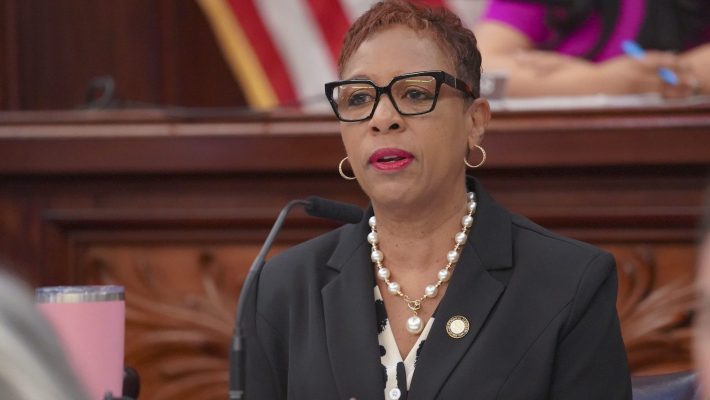The speaker of the City Council is demanding that Mayor Adams's signature housing initiative create more affordable units — but it's unclear if she backs the key proposal that undergirds the plan: ending mandatory parking.
Speaker Adrienne Adams's "City For All" proposal comes as progressives in the Council want more affordable housing out of Mayor Adams's "City of Yes" zoning change, but experts say that can't be accomplished if developers are still forced to build costly parking lots at new projects — a mandate that some Council members in suburban-like sections of eastern Queens and Southern Brooklyn want to continue.
Speaker Adams's proposal, released on Friday, does not mention whether she supports or opposes Mayor Adams's bid to eliminate the parking requirement citywide, and that silence unnerves supporters of affordable housing.
“If your intention is to [get more affordable housing out of City of Yes], then the best way is to also not add costs, which in this case would come in the form of parking requirements,” said Marcel Negret, the director of land use at the Regional Plan Association. "If you keep the requirements, you’re left with less to capture in terms of value to then require affordable housing."
Parking mandates
Removing parking mandates citywide is the key that would make the City of Yes elements of “transit oriented development” and “town center zoning” feasible in the first place, let alone as affordable housing.
“There are pieces for the [City of Yes] proposal that rely on removing parking mandates. If you retained the parking requirements as they are today, then huge pieces of the proposal would be instantly broken, including the town center piece and the transit-oriented development,” said Howard Slatkin, the executive director of the Citizens Housing and Planning Council.

For example, transit-oriented development sites already have commercial parking requirements. Under City of Yes, three- to five-story apartment buildings would be permitted on these sites with “commercial overlay,” but if there were two sets of parking requirements, development would be nearly impossible.
“There are a lot of places that are zoned for mixed-use development at relatively low densities, and you can build buildings that have both residential and retail, but you have to provide parking for both uses,” said Slatkin. “You might get housing, or you would get just retail, but you don't get both. You can't fit on the surface of the lot both the commercial and the residential parking. You can't build a mixed-use building with parking for both pieces at that scale. It's just not going to be remotely economic.”
Does 'City for All' help or hurt 'City of Yes'?
Advocates and government officials criticized the original City of Yes plan for its lack of mandatory affordability programs. The plan's central affordability proposal, “Universal Affordability Preference,” is a voluntary program that allows developers to build 20 percent more units in mid-high density areas, if those additional units are permanently affordable.
And affordability is a key concern of a large cohort of Council members.
“During last week’s hearings, we heard from New Yorkers on all sides, and their concerns shaped this approach,” Council Member Kevin Riley, Chair of the Subcommittee on Zoning and Franchises, said in a press release sent out by Speaker Adams's office. "This plan embodies our commitment to supporting New Yorkers at every stage — whether that’s preserving existing homes, protecting tenants, or making vouchers more accessible and effective. By addressing every aspect of housing, we are laying the foundation for a stronger, more equitable city for all New Yorkers."

Even supporters of City of Yes have mentioned affordability as a main concern, saying that Universal Affordability Preference isn’t enough and that focusing on increasing supply only will not solve the affordability problem.
“Affordability was really top of mind for New Yorkers, and certainly for members of this Council,” Rachel Fee, the executive director of the New York Housing Conference, told Streetsblog.
Fee, whose housing conference is part of a coalition of organizations that have been supportive of City of Yes, says the City for All proposal will help convince Council Members who are most concerned about affordability to support the mayor’s zoning reform.
“We've met with more than half the Council members now on City of Yes and affordability is a top issue in every single meeting, so I think that this will go a long way to garner support for some of the Council members who would just like to see affordability addressed in a bigger way,” said Fee.
Last week, City Hall put out a statement expressing general support for the Council proposal, though more negotiation will be necessary.
"We look forward to continuing our already productive conversation with the City Council to address the housing crisis,” City Hall said in a statement. “As discussions advance, we are encouraged to see that we continue to share many of the same policy goals and that the City Council recognizes this generational opportunity to move the needle on the city’s long-standing housing shortage."






